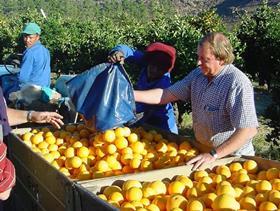
As South African citrus growers return from their summer holidays following a fairly difficult 2009 season, they are anxiously watching the world's markets to see what the future may hold.
This season's first volumes of South African citrus are set to be shipped from the country in six weeks' time, with growers hoping to make a positive start and avoid the tough market conditions of 2009. As in the past, the counter-seasonal crops produced in the Northern Hemisphere will have an impact on their start.
The latest information indicated that Spain will export 12 per cent more oranges this season, with navels and late navels some 2-3 weeks earlier than in 2009. The Moroccan orange export offering is down in volume terms after lower production and higher local demand, while Italy has recovered this season to see orange exports increase by 68 per cent.
Turkish orange production and exports are both forecast to be at similar levels to 2009, while early price indications in the UK and Germany are thought to be stronger than the same period last year.
In other categories, Spain is anticipating a 20 per cent fall in clementine volumes, with Moroccan soft citrus estimates down 50 per cent and Turkish volumes set to fall 15 per cent.
To the end of December 2009, Spanish lemon exports had fallen 10 per cent year-on-year, offset by a 27 per cent increase in Turkish lemon production and a 9 per cent rise in exports. The UK lemon market is reported to be well-balanced with good prices, while Germany is seeing more difficult conditions.
On the grapefruit front, Israel's estimates are up compared with 2009, while Turkish grapefruit is predicted to increase substantially, albeit from a small base. Through to December, the UK grapefruit market was reported to have been steady, with German market thought to be average.
Meanwhile, reports from Russia have indicated that conditions for citrus are difficult, with large volumes facing weak demand.



